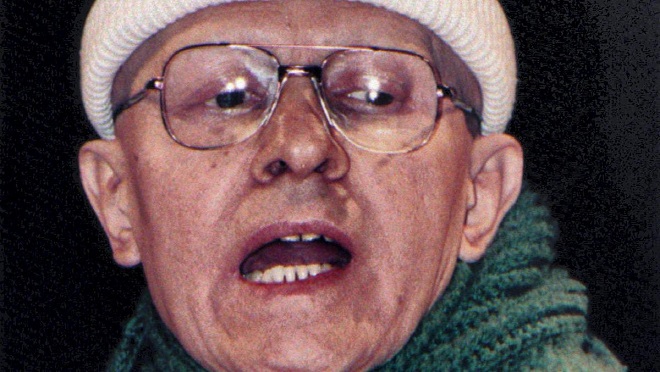Yes, you were right “We are sentenced to hope”, more than two decades after Wannous’s death, his plays retain their ability to surprise and connect with audiences.
It was March 1996 when the first Arab author was invited to give the World Theatre Day address. While Saadallah Wannous’s message was read out on stages around the world, the renowned Syrian playwright was fighting cancer. He died the following year, aged 56.
In his speech, Wannous said that we are “mahkumun bil-amal”, first translated as “condemned to hope”, which became the title of a 2012 collection of essays on Arab theatre. Now, in the first widely distributed anthology of Wannous’s plays in English, the phrase has been reworked once more to “sentenced to hope”.
The “Sentence to Hope’ anthology, edited and translated by Robert Myers and Nada Saab, gives only a glimpse of Wannous’s oeuvre: he wrote about 20 plays and a wealth of critical essays. The last five years of his life, after the writer was diagnosed with cancer of the pharynx, were perhaps his most productive. “Writing has been one of the most important means I’ve had to fight [cancer],” he said in his World Theatre Day address.
 Yet despite this global platform, Wannous’s plays remained little-known in the English-speaking world. The first translated collection was a 2014 specialist publication, Four Plays from Syria, co-edited by Marvin Carlson and Safi Mahfouz. The editors of Sentence to Hope also worked on that book. Their expanded anthology not only contains translations of Wannous’s plays, but a handful of his insightful essays and interviews. The anthology also sketches a portrait of a relentlessly self-critical playwright, always searching for new ways to imagine theater. The first work in the collection, An Evening’s Entertainment for the Fifth of June, was written after the 1967 Arab-Israeli Conflict, when about 100,000 Syrians fled their homes in the Golan Heights.
Yet despite this global platform, Wannous’s plays remained little-known in the English-speaking world. The first translated collection was a 2014 specialist publication, Four Plays from Syria, co-edited by Marvin Carlson and Safi Mahfouz. The editors of Sentence to Hope also worked on that book. Their expanded anthology not only contains translations of Wannous’s plays, but a handful of his insightful essays and interviews. The anthology also sketches a portrait of a relentlessly self-critical playwright, always searching for new ways to imagine theater. The first work in the collection, An Evening’s Entertainment for the Fifth of June, was written after the 1967 Arab-Israeli Conflict, when about 100,000 Syrians fled their homes in the Golan Heights.
In An Evening’s Entertainment, Wannous seems to be trying to shake his audience into action. It’s a play about a play, with a director as one of its central characters. This beleaguered director tries to get on with the evening’s patriotic revelry while “spectators” come to upend the power dynamic, going on to the stage to talk about the war.
In an essay at the end of the collection, The Dream Falls Apart, Wannous explained his disappointment at the response to the play “After the play ended, people would applaud and then leave the theater as they always had after any other performance. They would whisper, laugh, or express amazement. But then what? Nothing. Nothing at all.”
 The major shift in Wannous’s writing is found in 1977. The change was not immediately clear as, for the rest of the 1970s and most of the 1980s, Wannous was “in the crypts of depression”. During those years he didn’t write, although he said he read a great deal. His next play, which came in 1989, was radically different. It was less focused on broad social movements and looked more at individuals. In a 1996 dialogue with Mary Ilyas, which is also in the anthology, Wannous talked about this new phase of his writing. He sounded both grimmer and more optimistic, and he told Ilyas that he found this new sort of writing a personal liberation. “For the first time I feel writing is a pleasure,” he said.
The major shift in Wannous’s writing is found in 1977. The change was not immediately clear as, for the rest of the 1970s and most of the 1980s, Wannous was “in the crypts of depression”. During those years he didn’t write, although he said he read a great deal. His next play, which came in 1989, was radically different. It was less focused on broad social movements and looked more at individuals. In a 1996 dialogue with Mary Ilyas, which is also in the anthology, Wannous talked about this new phase of his writing. He sounded both grimmer and more optimistic, and he told Ilyas that he found this new sort of writing a personal liberation. “For the first time I feel writing is a pleasure,” he said.
The collection’s final plays, Wretched Dreams and Rituals of Signs and Transformations, are both from that period. These works foreground the struggle of individuals oppressed by various social hierarchies that are prominent. In Wannous’s earlier works, female characters are few and nameless. By contrast, the play Wretched Dreams is all about the hopes of two women, Mary and Ghada. Those two richly imagined characters, both of whom want to murder their husbands, are the heart of the play. Their husbands are both grotesqueries, but they’re also compelling characters. Faris is a manipulative buffoon while Kazim is a thug who doesn’t understand why his wife can’t simply fall in line and love him.
The last play in the collection, Rituals of Signs and Transformations, is set in Damascus during the late 1800s. Here, the stage takes a Sufi path. Throughout the play, core characters give up their old lives and undergo humiliations on their way to finding new hope, although their new lives remain a work-in-progress.
The only path for us as Syrians is Hope, we have demonstrated throughout this dirty war an unprecedented amount of patience ….because we are “Sentenced to hope”
Lama Alhassanieh

